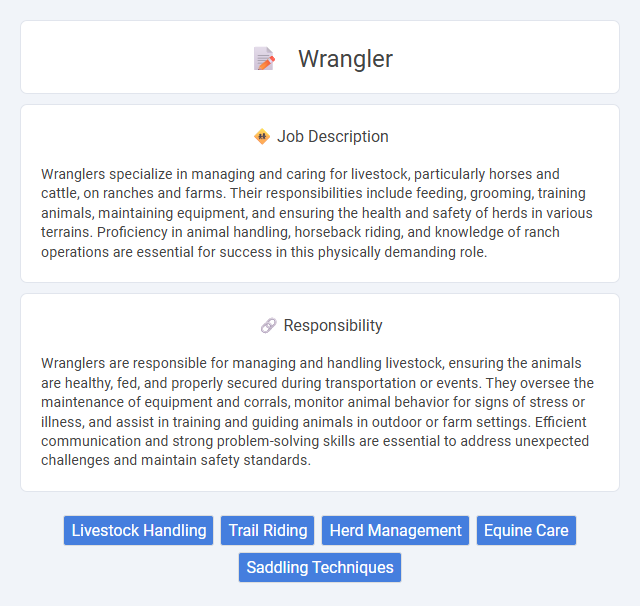
Wranglers specialize in managing and caring for livestock, particularly horses and cattle, on ranches and farms. Their responsibilities include feeding, grooming, training animals, maintaining equipment, and ensuring the health and safety of herds in various terrains. Proficiency in animal handling, horseback riding, and knowledge of ranch operations are essential for success in this physically demanding role.
People with a passion for outdoor work and strong physical stamina are likely to be well-suited for a wrangler job, as it often requires handling animals and navigating rugged terrain. Those who prefer routine or indoor environments may find this role less compatible with their preferences. Typically, individuals possessing patience, quick problem-solving skills, and comfort with animal behavior are probable candidates for success in this demanding occupation.
Qualification
Wrangler positions require strong livestock handling skills and a deep understanding of animal behavior, particularly horses and cattle. Candidates must possess physical endurance, proficiency in riding and roping, and knowledge of safety protocols on ranches or wildlife reserves. Experience with trail riding, animal care, and basic veterinary skills enhances employability in this demanding outdoor profession.
Responsibility
Wranglers are responsible for managing and handling livestock, ensuring the animals are healthy, fed, and properly secured during transportation or events. They oversee the maintenance of equipment and corrals, monitor animal behavior for signs of stress or illness, and assist in training and guiding animals in outdoor or farm settings. Efficient communication and strong problem-solving skills are essential to address unexpected challenges and maintain safety standards.
Benefit
Wrangler jobs likely offer significant opportunities for outdoor work, appealing to those who enjoy physical activity and nature. Benefits often include flexible schedules and the chance to develop skills in animal care and horsemanship. There is probable value in working as part of a team in dynamic, rustic environments that promote personal growth and resilience.
Challenge
Wrangler jobs likely present significant challenges due to the demanding physical tasks and unpredictable environmental conditions involved. Managing livestock requires constant vigilance and problem-solving to handle potential injuries or behavioral issues. The probability of encountering difficult situations, such as adverse weather or emergencies, often necessitates quick decision-making and adaptability.
Career Advancement
Wranglers can advance their careers by gaining expertise in livestock management and mastering advanced horsemanship skills. Progression often leads to supervisory roles such as lead wrangler or ranch manager, where responsibilities include overseeing operations and training junior staff. Pursuing certifications in animal care and expanding knowledge in sustainable ranching practices significantly boost employment opportunities and career growth.
Key Terms
Livestock Handling
Wranglers specialize in livestock handling, expertly managing cattle, horses, and other ranch animals to ensure their safety and well-being. They use techniques such as herding, feeding, and health monitoring to maintain optimal animal condition. Proficiency in animal behavior and strong physical endurance are essential for effective livestock management in rugged outdoor environments.
Trail Riding
Wranglers specialize in trail riding by guiding and managing horses across diverse terrains, ensuring rider safety and an enjoyable outdoor experience. They possess expertise in horse behavior, trail navigation, and emergency preparedness to handle unpredictable conditions on the trail. Wrangler roles often require physical stamina, customer service skills, and knowledge of local wildlife and environmental regulations to enhance trail ride adventures.
Herd Management
Wranglers specializing in herd management oversee the daily care, movement, and health monitoring of livestock such as cattle or horses, ensuring optimal grazing patterns and preventing overpopulation in grazing areas. They implement strategies for breeding, nutrition, and disease control to maintain herd productivity and sustainability. Strong knowledge of animal behavior and environmental conditions is critical for effective herd management in both ranch and wildlife settings.
Equine Care
Wranglers specializing in equine care are responsible for the daily management and grooming of horses, ensuring their health and well-being through proper feeding, cleaning, and exercise routines. They monitor equine behavior and physical condition to identify signs of illness or injury, facilitating prompt veterinary intervention when necessary. Expertise in stable maintenance and knowledge of equine nutrition and breeding practices are essential for optimal horse care and performance.
Saddling Techniques
Wranglers specializing in saddling techniques expertly prepare horses by selecting and fitting saddles tailored to each animal's anatomy and the rider's needs, ensuring comfort and safety. Proficient in various saddle types such as Western and English, they skillfully adjust straps and secure cinches to prevent slipping during rides. Mastery of saddling methods is crucial for maintaining horse health, optimizing performance, and enabling efficient trail or ranch work.
 kuljobs.com
kuljobs.com